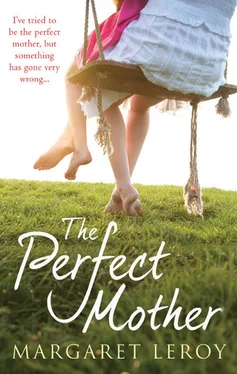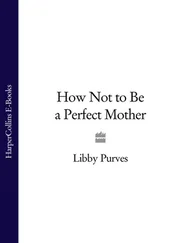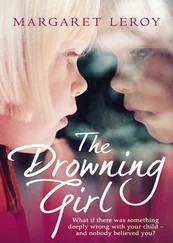1 ...7 8 9 11 12 13 ...16 ‘Mrs Lydgate. I’ve heard about your troubles with Daisy.’ Her face is close to mine, she’s speaking in an undertone, as though this is something of which I may be ashamed. ‘I did want to say—I really do feel you’re doing the right thing in making her come in.’
‘I don’t know,’ I say.
‘It’s awful if your child’s unhappy at school,’ she says. ‘I had a lot of trouble with my daughter once—she wouldn’t go to school. We found it was friendship problems.’
‘I really don’t think it’s that,’ I say. ‘Daisy’s had flu, it’s like she can’t get over it.’
‘I used to send my daughter in with a nice snack for break time. One of those muesli bars, or a packet of raisins. She seemed to find it a comfort. Perhaps you could try that with Daisy.’
‘It’s a good idea,’ I say politely. ‘It’s just such a problem finding anything that she’ll eat.’
‘Well, keep up the good work,’ she says, and weaves her way out through the mass of parents. I feel uneasy, as though I have been reprimanded, although I’m sure she was only trying to be helpful. The rain collects in my parting and splashes down my face like falling tears.
In front of me the women shift and move. I see Fergal, just ahead of me, the unruly fair hair at the back of his head, the dark wet gleam of his jacket. He has a large umbrella that says Assisted Evolution.
I edge forward. He turns and sees me, eyes widening with recognition. I admit to myself that this is what I meant to happen. He makes a slight beckoning gesture with his head. With a huge sense of inchoate relief I move in under his umbrella.
‘Catriona.’ He smiles. I feel that something in me amuses him.
We have to stand close to stay out of the wet. He’s chewing gum: I can smell his wet hair and skin. I’m suddenly aware of how pink my face must be, of my hair all plastered down, that I’m wearing my oldest coat and the cuffs are fraying.
‘I don’t often see you here,’ he says.
Maybe, I think, he has been looking for me. I remember that fantasy I had, of moving my hands across his face and his head. My skin is suddenly hot.
‘I’m not here very often,’ I tell him. ‘Daisy’s ill.’
‘What’s wrong?’
‘I don’t know. Nobody seems to know.’
He’s listening, waiting.
‘Richard tells me not to worry—he thinks it’s just flu—you know, some kind of virus.’
He looks me up and down, taking me in.
‘It makes it harder really,’ I tell him. ‘I know this must sound stupid—but the more he says I mustn’t worry, the worse I seem to feel.’
‘Poor kid,’ he says. ‘Poor you.’
He puts his hand on my arm, leaves it there perhaps a second too long. A hunger opens out in me. I would like to peel back my wet sleeve and feel his hand warm on my skin.
We stand there for a moment, watching the children, while the rain beats down like a drumming of many fingers.
‘By the way,’ he says then, ‘I know why I know you.’
‘Oh.’ I feel that I am falling.
‘Aimee Graves,’ he says. His tone is easy, as if it’s the most natural thing.
He hears my quick intake of breath.
‘I’m right, then,’ he says. ‘I’m sorry—perhaps I shouldn’t have talked about it here.’
He turns toward me: he has a frown like a question.
For a moment, I don’t answer, I don’t know what I think. There are two things at once: this fear that makes my pulse so thin and fast and jagged, and a strange voluptuous sense of relief, of wanting to open myself up to him completely.
‘You know her?’ I say.
‘I met her once,’ he says. ‘It was a story I was researching.’
‘She’s alive, then, she’s OK?’
‘She’s OK,’ he says.
‘So you know all about me,’ I say, quite lightly.
‘I didn’t say that,’ he says.
I can see Daisy coming; it’s the end of the conversation. Daisy is with Megan, who has her arm around her. She looks so pale, so different from the other girls. She says goodbye to Megan and comes to me. I hug her, she sinks her face into me. Fergal pulls away a little, but holds his umbrella above us.
‘OK?’ I say, my mouth in her hair.
‘Mmm.’ She’s trembling a little.
I take her bag, as you might with a much younger child. She doesn’t protest at this indignity.
‘Catriona, if you want to talk some time,’ says Fergal. ‘I mean, I could explain.’
I nod. He moves off to find Jamie.
The rain is easing up now. There’s a gleam of sunlight between the patchy clouds, and a rainbow flung across the sky behind us. I point out the rainbow to Daisy, but she doesn’t turn.
We walk back to the car. I feel shaken.
I open the car door for her. ‘Look, I brought Hannibal for you. He’s missed you,’ I tell her.
‘Honestly, Mum, he’s a cuddly toy,’ she says. ‘And what if somebody sees?’
‘Nobody can see,’ I tell her.
She tucks him under her arm.
I watch her in the mirror.
‘So was it OK today?’ I ask her.
‘My stomach hurt,’ she says. ‘I wanted to come home but Mrs Griffiths wouldn’t let me. She said, “Well, what should I do? I can’t send you home when you’re hardly ever here.”’
We drive to the doctor’s through the white shine of the puddles.
‘Did anything interesting happen?’ I say.
‘We had to do our New Year wishes,’ she says.
‘So what did you put?’
‘I put world peace and a cat. We all put world peace, and Kieran put, “For my Dad to get his new kidney.” Mrs Griffiths said if we put world peace we should put it first, but when we came to Kieran she said, “Well, which do you think is the more important?”’
There’s a lump in my throat, but I don’t know why. There are so many things to cry for.
I have never seen Dr Carey before; she must be new, or a locum. She’s wearing a crisp red jacket with shiny buttons, and she has short elfin hair and upward-tilting eyebrows. She seems earnest, conscientious, pretty in a wholesome schoolgirl way—someone who’d always be top of the class and make lots of neat notes.
She greets Daisy as well as me. She has an open smile. I immediately like her.
We sit by the desk, Daisy in an armchair, clutching Hannibal. It’s pleasant in here, for a surgery: the walls are blue, and there are toys on the window sill, and on the doctor’s desk a jug of marbled lollipops in cellophane, bright-coloured as balloons.
Dr Carey looks at me expectantly.
‘Daisy’s been ill for four weeks,’ I tell her. ‘She went to school today, but that’s only the second time this term. It started with flu and she’s never really recovered.’
‘Oh, dear. How horrid for you,’ says Dr Carey to Daisy.
Daisy shrugs, embarrassed.
I breathe out a little; I feel that we are cared for. This doctor is kind, gentle, warm to Daisy. This time at least we will be understood.
‘Well, Daisy,’ she says, ‘we’d better have a look at you.’
Daisy lies on the couch and Dr Carey feels her lymph glands and her stomach.
‘Well done,’ she says. ‘That’s excellent. That’s absolutely fine.’
Then Daisy stands on the scales and is measured and weighed.
Dr Carey sits back at her desk, gets out a weight chart. A little frown pinches the skin between her eyes. I suddenly imagine how she’ll look when she is older, with stern lines round her mouth and glasses on a chain.
‘Daisy’s really rather underweight,’ she says. ‘She’s on the lowest percentile.’
‘I don’t know what that means.’
‘I’ll show you.’ She turns the chart towards me, points at it with her pen. ‘The average is here,’ she says, ‘and Daisy’s right at the bottom.’
Читать дальше












